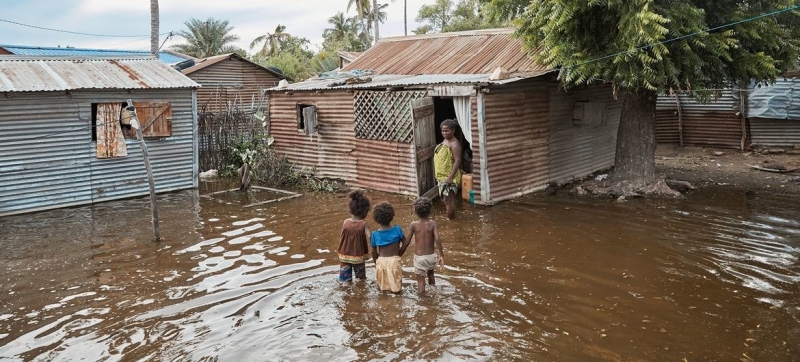- Iran vows to hit all ME economic hubs if US-Israeli attacks persist |
- Sammilito Islami Bank merger to continue: Governor |
- Biman Suspends Flights to Six Middle East Cities Over Tensions |
- Govt Announces 25pc Rail Fare Discount |
- Middle East War Puts Bangladesh Jobs at Risk |
COP30: WHO Warns Climate Crisis Driving Global Health Risks

Climate-related disasters like floods, as pictured in Madagascar, can lead to a range of health problems.
Climate change is already fuelling a global health emergency, killing more than half a million people each year through extreme heat and threatening hospitals worldwide, according to a major report released on Friday at COP30 in Belém, Brazil.
The special report on health and climate change, published by the UN World Health Organization (WHO) and the Brazilian Government, warns that one in 12 hospitals could face climate-related shutdowns. It calls for urgent action to protect health systems in a rapidly warming world.
This follows Thursday’s launch of the Belém Health Action Plan, a flagship COP30 initiative placing health at the centre of climate policy.
What the WHO says
“The climate crisis is a health crisis – not in the distant future, but here and now,” said WHO Director-General Dr Tedros Adhanom Ghebreyesus.
“This special report provides evidence on the impact of climate change on individuals and health systems, and real-world examples of what countries can do – and are doing – to safeguard health and strengthen health systems.”
Why it matters
Global temperatures have already surpassed 1.5°C. The report finds that 3.3 to 3.6 billion people live in areas highly vulnerable to climate impacts, while hospitals now face a 41 per cent higher risk of extreme-weather damage compared with 1990.
Without rapid decarbonisation, the number of health facilities at risk could double by mid-century. The health sector itself contributes around 5 per cent of global greenhouse gas emissions, underscoring the need for a swift transition to low-carbon, climate-resilient systems.
Key gaps in health adaptation
The report highlights critical shortcomings in national health adaptation efforts:
Only 54 per cent of adaptation plans assess risks to health facilities.
Fewer than 30 per cent consider income disparities.
Just 20 per cent include gender considerations.
Less than 1 per cent include people with disabilities.
Progress has been made — the number of countries with multi-hazard early warning systems doubled between 2015 and 2023 — but coverage remains uneven, particularly in least developed countries and small island states.
What’s being done
Adding momentum, a coalition of more than 35 philanthropies pledged $300 million on Friday to speed up solutions at the intersection of climate and health.
The Climate and Health Funders Coalition — including Bloomberg Philanthropies, the Gates Foundation, the IKEA Foundation, The Rockefeller Foundation and Wellcome — will support innovations, policies and research on extreme heat, air pollution and climate-sensitive diseases, as well as strengthen health systems and integrate climate-health data.
The coalition’s inaugural funding supports the Belém Health Action Plan and aims to deliver “no-regret” interventions that save lives now. With the past decade the hottest on record and temperatures expected to remain near historic highs, experts warn that inaction could lead to catastrophic health consequences.
'Adaptation is urgent’: COP30 health envoy calls for action
Ethel Maciel, COP30’s special envoy for health and one of the architects of the Belém Health Action Plan, stressed that climate change is no longer a distant threat — it is reshaping health systems today.
“How do we prepare our health units, our hospitals and our structures for extreme events that will occur with increasing frequency? And how can we build capacity among health professionals so they can respond to these climate-driven emergencies?” she said.
She noted Brazil’s deadly flooding in Rio Grande do Sul last year, which triggered the largest dengue epidemic in the country’s history. “It’s not something for the future; it’s happening now. Adapting our system is urgent.”
Ms Maciel outlined three pillars of the plan:
Monitoring: Integrating climate and health data to forecast heat-related demand and improve reporting of climate-linked illnesses.
Resilient systems: Training health professionals to identify and treat impacts such as dehydration and cardiac stress.
Research and innovation: Developing heat-resistant medicines and vaccines, reducing pollution in health supply chains, and expanding renewable energy use.
She warned that implementation is critical in the Amazon, where deforestation could unleash unknown pathogens. “We have pathogens that we do not yet fully understand,” she said, urging leaders to ensure the plan “does not become just another beautiful declaration that fails to translate into action.”

